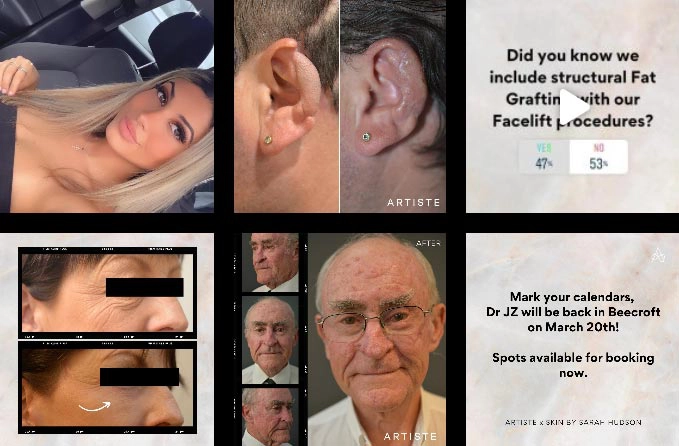Deep Plane Facelift: Are You A Good Candidate?
Model featured in photography
The idea of being a “good candidate” for surgery is a misnomer for some. It’s not about having certain traits or qualities that make someone automatically “qualify” for a procedure. Instead, candidacy should be viewed as something carefully determined by your surgeon based on a comprehensive evaluation.
When discussing candidacy for a deep plane facelift, your surgeon takes the time to review your health history, if you are taking any medications currently, and your understanding of the potential risks and benefits involved.
Ultimately, being a candidate isn’t about meeting a checklist, rather it’s ensuring you and your surgeon share realistic goals and a thorough understanding of the procedure’s outcomes. This article explores factors that contribute to candidacy for a deep plane facelift and how you can determine with your surgeon if it’s the right option.
Am I a Good Candidate for a Deep Plane Facelift?
The decision to undergo a deep plane facelift isn’t about meeting certain physical or age criteria. Instead, candidacy is based on a range of factors, from physical and lifestyle to emotional readiness and realistic expectations.
Here are some key aspects to consider before proceeding with a major decision such as undergoing cosmetic surgery.
1. Physical Health and Medical Conditions
Good candidates for deep plane facelifts are generally in good overall health, not currently smoking, and don’t have medical conditions which could affect the safety or effectiveness of surgery.
For example, conditions like poorly controlled hypertension, certain heart issues, and diabetes may affect recovery or increase the risk of complications.
2. Understanding Your Reasons and Self-Confidence
Undergoing cosmetic surgery is a deeply personal choice, but you must evaluate your reasons and consider whether a facelift aligns with your overall well-being.
It’s important to understand cosmetic surgery cannot create or sustain self-confidence. It may “alter” physical features, but there’s not magic solution or treatment that guarantees lasting confidence.
True self-assurance comes within and is best nurtured through self-acceptance and, for some, guided therapy. If your main reasons for undergoing surgery centre on overcoming self-esteem challenges, it’s worth taking a step back.
It’s essential to discuss your motivations in-depth with your surgeon who’ll provide an honest assessment of the procedure’s limitations.
3. Realistic Expectations
No two surgical outcomes are unique, and understanding the range of possible results is essential for anyone considering a deep plane facelift.
Having goals about your intended appearance is natural. However, it’s equally important to recognise that no procedure can completely halt ageing or achieve “perfection”. Setting realistic, well-informed expectations with your surgeon may help ensure satisfaction with the final outcome.
4. Emotional Readiness and Decision Making
Surgery can be stressful, but physically and emotionally. You must approach any cosmetic surgery, not just a deep plane facelift, with clarity. Reflect on whether you’re making this choice for yourself and not due to any external pressures or temporary emotions.
Additionally, patients with possible Body Dysmorphic Disorder (BDD) may have heightened dissatisfaction with their appearance after surgery. BDD screening is recommended to help identify and address unrealistic expectations. Consulting with your surgeon in recognising emotional readiness is immensely valuable in the decision-making process.
In the end, deciding candidacy for a deep plane facelift goes beyond physical traits or age. It’s about evaluating your motivations, understanding the limits and possibilities of the procedure, and being emotionally ready for the process and the outcome.
Before making a final decision, take all the time needed to explore your options and discuss them thoroughly with a Specialist Plastic Surgeon. Dr. Jack Zoumaras is ready to address any of your questions and concerns. You may schedule a quick consult with him.
Disclaimer: At Artiste Plastic Surgery, our Plastic Surgeons led by Dr Jack Zoumaras have been trained to the highest possible degree. All surgery has risks and it is always advised to get a second opinion. Risks are very real and we cannot guarantee any result. Results are illustrated as a guide only. All risks are managed and any need for revision surgery or complications (1-5%) can be managed by our specialist plastic surgeons.
Any statements on how you will feel is based on Level V Evidence:
Level V: How you will feel after plastic surgery varies between individuals, depending on psychological and physical factors. Our internal research is based on how patients in our practice feel after surgery.
The blogs are not a substitute for a medical consultation and do not form as part of the doctor to patient relationship.
SHARE THIS ARTICLE
Jul01
Facelift Recovery Tips: What Speeds Up Healing and What to Avoid
Disclaimer: At Artiste Plastic Surgery, our Plastic Surgeons led by Dr Jack Zoumaras have been trained to the highest possible degree. All surgery has risks and it is always advised ...
Jul01
How to Prepare for Facelift Surgery: What to Do Before Your Big Day
Disclaimer: At Artiste Plastic Surgery, our Plastic Surgeons led by Dr Jack Zoumaras have been trained to the highest possible degree. All surgery has risks and it is always advised ...
ABOUT ARTISTE
Artiste Plastic Surgery is an Award Winning Specialist Plastic Surgery practice led by internationally trained Dr. Jack Zoumaras, Plastic Surgeon and Peer Reviewed Face Surgeon
Artiste offers the latest Cosmetic Surgical Procedures of the Face, Breast and Body, inspired from leading centres around the world.
STAY IN THE LOOP
Enter your email address below to receive updates on new articles and VIP access to promotions and special offers.
FOLLOW US ON INSTAGRAM










